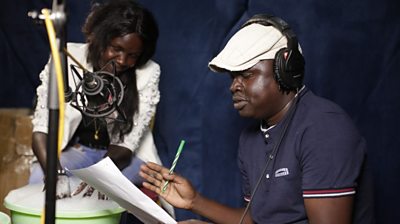You can use your gun as an ATM, to withdraw money. An AK47 is an ATM.”
Kululu Elgebana was born in 1984 in Sudan, during Africa’s longest-running civil war, before South Sudan even existed.
Like so many children growing up in conflict, he lacked many basic necessities, including access to education. It wasn’t until he was 10 that he started to study language and drama at a local church.
Soon after, he joined the military, and became a child soldier.
“If you become a soldier, and you have some small amount of education, they say you can get something to eat,” he recalls now.
While some children are forced to join militia groups, others may feel they have no other option but to join - driven by economic and societal pressures. Children may feel they need to earn money and feed themselves. They may also face significant pressure from within their community, and fear being labelled a coward if they don’t sign up.
It is only when they get to the battlefield that the full horror of war is revealed.
“You have good soldiers and bad soldiers. Bad soldiers, when they go to war, … they are ambushing people, they are robbing people, they are raping women,” Kululu said. “When they are working as soldiers, they are brainwashed.”
Luckily for Kululu, when he was 14, his brother got a scholarship for further studies in Kenya and asked him to join. Kululu excelled in his studies, and after successfully finishing secondary school he found a way to apply his love of acting and storytelling whilst studying with a film-focused INGO.
It was here that he realised the impact he could have as a storyteller.
“People watching, some end up crying because it is their true story that they are watching being acted out – ‘this is what happened to me’.”
Kululu returned to South Sudan during the Comprehensive Peace Agreement in 2005, when the UN were repatriating refugees. He began with �鶹�� Media Action as a scriptwriter for its brand-new radio drama, Life in Lulu, in 2012.
“Writing storylines for a drama in South Sudan is very easy. Every script is a story, a story that I have been told.”
Today, it is Kululu’s first-hand experience that enables him to create emotive and realistic characters, like the reformed child soldier Victor. This can help others to avoid making the same mistakes.
“They can learn out of my experience, learn out of my knowledge, and do something,” he said. “I see myself now as a good man. It was me who delayed myself. But I am proud to be myself, and proud to be South Sudanese.”
Unfortunately, this storyline is still all too relevant as conflict continues in the region. Many hoped the conflict was over in July 2011 when South Sudan gained independence after over 20 years of civil war. Sadly, the optimism that greeted the world’s newest country’s birth was shattered as it was plunged back into civil war in 2013. Today, communities still face localised conflict between government and opposing forces, intercommunal violence, and a growing humanitarian crisis from the vicious war in neighbouring Sudan.
This means youngsters continue to pay a heavy price, as Kululu did before. Experts estimate that in February 2021, there remained between 7,000 and 19,000 child soldiers in the country.
Life in Lulu storylines highlight these and other social challenges in the country, including the impact of dangerous power dynamics and sexual and gender-based violence. None of these storylines would be possible without our scriptwriters’ knowledge and passion to share their stories, which help to change perspectives and attitudes.
Our 2020 research reflects the need for this type of radio programme, demonstrating how Life in Lulu works and why it is so powerful. The next series is focused on gender-based and intimate partner violence - helping to change the story for women and girls by showing different solutions and alternatives.
With your help we can continue to support projects like Life in Lulu, ensuring other talented actors and scriptwriters like Kululu can create positive change through storytelling!
Support us
-
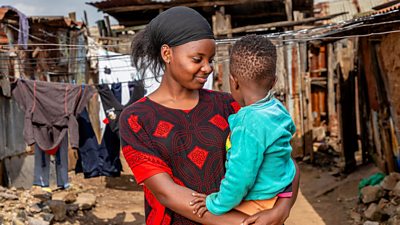
Support our winter 2024 appeal!
Our work with local broadcasters around the world supports communities to adapt and prepare for extreme weather as the climate changes - read more about our work in Kenya -
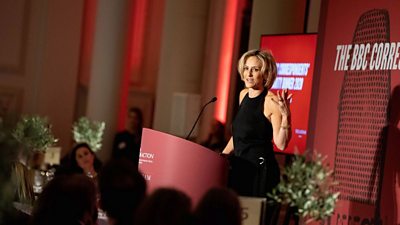
The �鶹�� Correspondents' Charity Dinner
Our flagship charity dinner in the Grand Ballroom at The Langham, London -
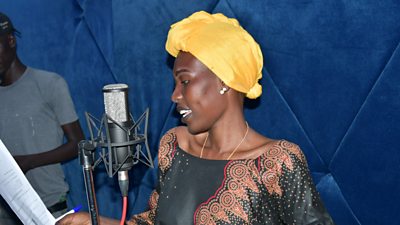 Donate through the PayPal Giving Fund and 100% of your donation comes to us! (Note this link takes you to the PayPal Giving website and its use is governed by their t&cs and privacy policy - see links below)
Donate through the PayPal Giving Fund and 100% of your donation comes to us! (Note this link takes you to the PayPal Giving website and its use is governed by their t&cs and privacy policy - see links below) -
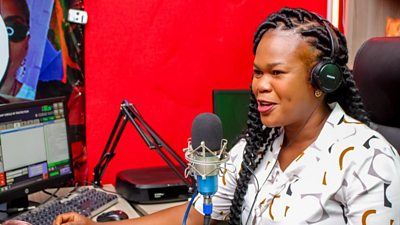 Sign up to payroll giving through Giving Online - type in �鶹�� Media Action and charity number 1076235. (Note this link takes you to Giving Online's website and its use is governed by its t&cs and privacy policy)
Sign up to payroll giving through Giving Online - type in �鶹�� Media Action and charity number 1076235. (Note this link takes you to Giving Online's website and its use is governed by its t&cs and privacy policy) -
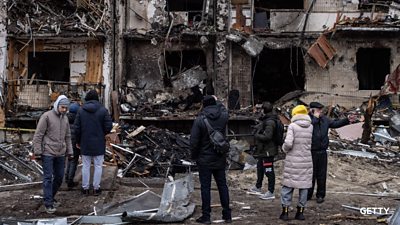 Support our work in Ukraine by donating through JustGiving. (Note this link takes you to JustGiving's website and its use is governed by its t&cs and privacy policy)
Support our work in Ukraine by donating through JustGiving. (Note this link takes you to JustGiving's website and its use is governed by its t&cs and privacy policy) -
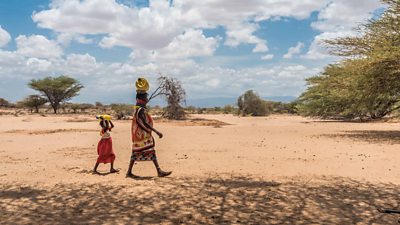 Support our work with communities on the frontlines of climate change by donating through JustGiving. (Note this link takes you to JustGiving's website and its use is governed by its t&cs and privacy policy)
Support our work with communities on the frontlines of climate change by donating through JustGiving. (Note this link takes you to JustGiving's website and its use is governed by its t&cs and privacy policy)
